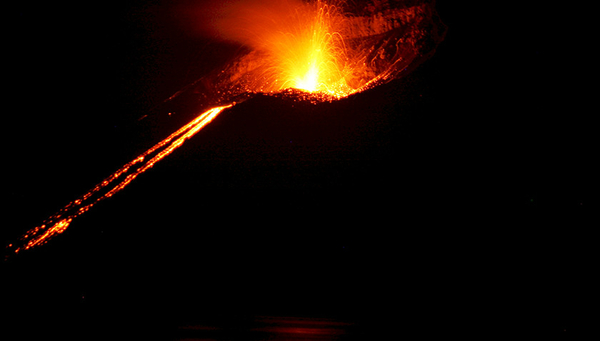Archive detail
Major volcanic eruptions may contribute to global warming
November 24, 2015 |
Since 1989, cherry trees in Switzerland have flowered 13 days earlier than in the previous 95 years (records began in 1894). Also since 1989, the sand martin has returned to the UK from Africa, on average, 11 days earlier. Over the same period, Swiss rivers have experienced a sharp increase (by up to 1.7°C) in water temperatures, with substantial impacts on the brown trout in particular.
Former Eawag environmental chemist Renata Hari explains: “If the water temperature rises above 19 degrees, brown trout stop eating and live off their fat reserves.” In earlier research projects investigating declining fish yields (“Fischnetz”) and the state of surface waters in the Aar valley (GZA), Hari showed that, as a result of rising temperatures, populations of brown trout have declined throughout Switzerland: “Brown trout habitats have now shifted to cooler altitudes, 150 metres higher than in the past.”
Changes in natural systems worldwide
During the “Fischnetz” project, Hari established contact with Philip C. Reid, an oceanographer working at the Sir Alister Hardy Foundation for Ocean Science (SAHFOS) in the UK. In 2001, Reid reported that the abundance of phytoplankton in the North Sea had increased abruptly, by 80 per cent, after 1987. This shift coincided with a significant increase in catches of horse mackerel (Trachurus trachurus), as well as higher surface temperatures in the North Sea.
Following a workshop held at Eawag in autumn 2012 – jointly organized by Reid and Hari – it was decided that this phenomenon should be examined in more detail, since a variety of studies indicated that abrupt shifts in natural systems had occurred worldwide in the latter half of the 1980s.
Shifts confirmed by analysis of time series
Renata Hari says, “After combing through countless scientific publications, we analysed environmental data from about 1000 different long-term time series.” The results were unequivocal: “A step change in temperatures occurred globally around 1987, triggering lasting shifts in numerous natural systems.” In the Swiss Central Plateau, for example, according to Christoph Marty of the SLF Institute for Snow and Avalanche Research, the number of snow days fell from 30 to around 14 per year. In the forests of the western US, seasonal wildfires lasted on average 29 days, compared to 5 days between 1970 and 1985, and in the Japan Sea, temperatures at a depth of 50 metres rose by 1.3°C.
72 of the analysed time series were reported in a paper entitled “Global impacts of the 1980s regime shift”, published in Global Change Biology on 24 November.
Anthropogenic warming intensified by volcanic eruption
The study, which involved a total of 29 scientists from 35 institutions, produced another particularly interesting finding. According to climatologist Jeff Knight of the Hadley Centre (UK Met Office), the global regime shift was partly attributable to the massive 1982 eruption of the Mexican volcano El Chichón, which injected around 7 million tonnes of sulphur dioxide and 20 million tonnes of aerosols into the stratosphere.
Philip C. Reid comments: “Our work contradicts the conventional view that major volcanic eruptions just lead to a cooling of the world.” Although the eruption of El Chichón was initially responsible for a cooling of 0.2–0.3°C, thus offsetting anthropogenic warming, this effect was short-lived. From the mid-1980s, temperatures rebounded very rapidly, and, according to Reid, “The speed of this change has had a pronounced effect on many biological, physical and chemical systems throughout the world.”
In other words, the findings of this study suggest that major volcanic eruptions with stratospheric impacts can reinforce the effects of anthropogenic warming and thus have previously unsuspected consequences. As Hari notes, “This shows that the risks of geoengineering approaches – such as artificial injection of aerosols into the stratosphere – may be greater than has been assumed to date.”
See also original publication: http://onlinelibrary.wiley.com/doi/10.1111/gcb.13106/epdf
Contacts for media inquiries:
- Renata Hari, formerly Eawag, renata.hari@clutteremeriti.eawag.ch, 052 343 85 34
- Jeff Knight, Hadley Centre, Exeter (UK), jeff.knight@cluttermetoffice.gov.uk

